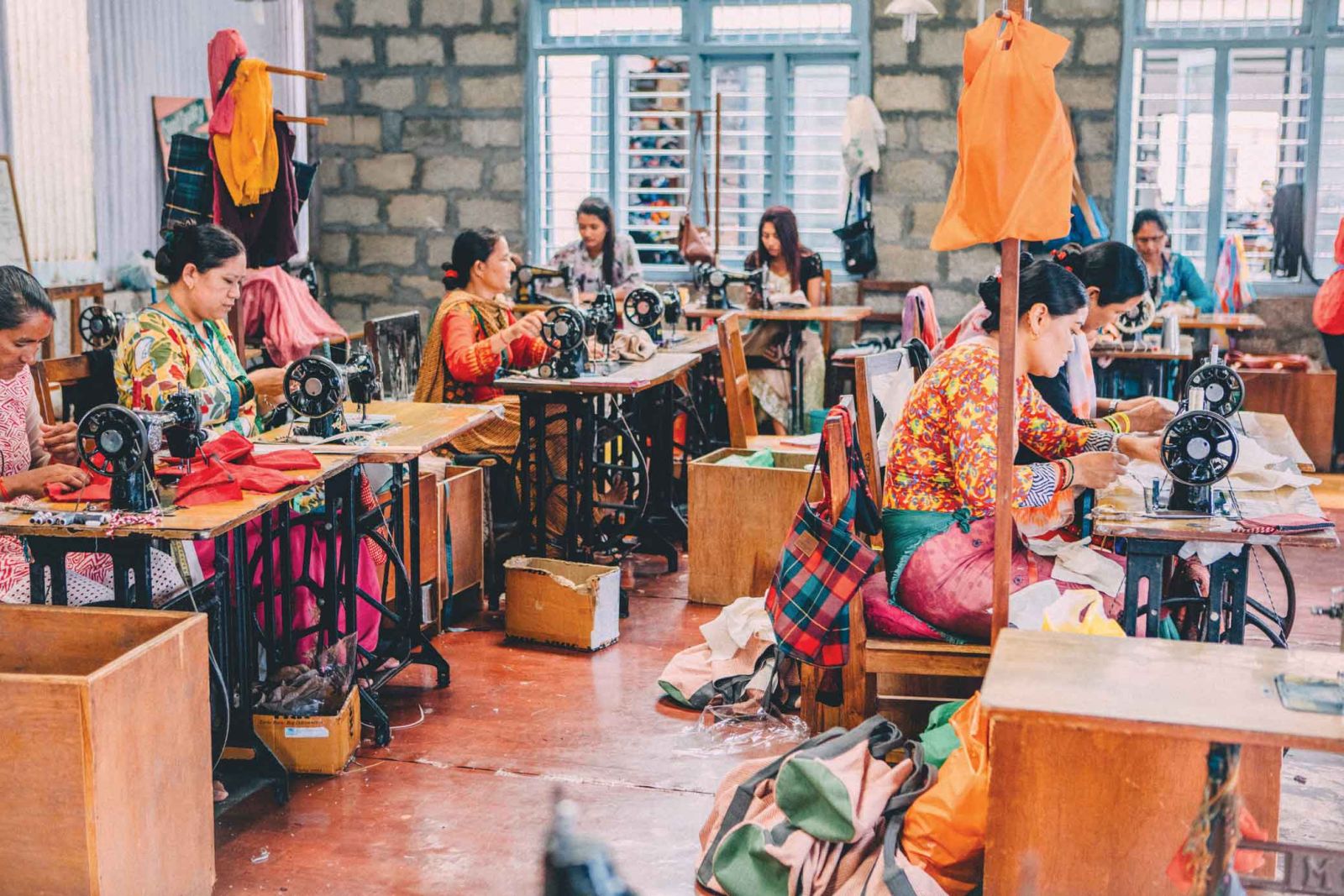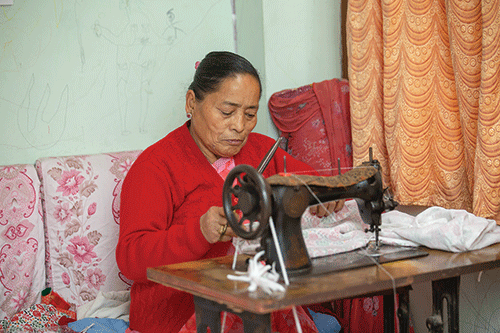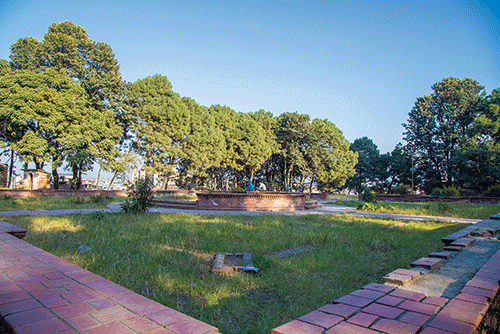Ram Kali Khadka watches the women at work as their craft slowly takes shape. The lives of the weavers are much like the products they make. They gather like the strands, tangle like the ribbons, their lives have many twist and turns.
"Sa…the male pheasant is searching for food, Sa…the female pheasant is helping her mate," these words from the popular song 'Sa..Karnali' by Nepali folk band Nepathya perfectly pictures life in the Karnali region. The underdeveloped region hidden behind the picturesque landscape is isolated from rest of the country and marred by poverty. The people here are caught in a landslide, with no escape from harsh reality. But, Ram Kali Khadka dared to break the shackles to change the stereotypical role women played, and inspired many other women like her to become dream weavers. She was born in Mugu, to a family dependent on farming. Her childhood wasn't easy, and she couldn't study beyond SLC. She was educated in Mugu, at a time when there were no roads, but she was paving her own path of destiny. Her upbringing helped her in her path. Being a farmer's daughter, she learnt many things like patience, appreciation of her roots, and the desire to grow into something especial.
It was the year 1975, on the occasion of International Women’s Day, when a group of women converged and decided to break out of the mould by forming the Women’s Skills Development Project. It later became the Women's Skills Development Organization (WSDO), a non-profit fair trade organization. Ram Kali joined the project two years later, but her desire to help her fellow women was not new. It was during her years working for the government that she had realized something had to be done to empower women. Ram Kali had studied and practiced home science at the Women Trading Center and she brought her experience to WSDO. The aim of the project was to empower marginalized and vulnerable women, helping them come out of the chrysalis. The project provided women from rural background with training on craft making, such as weaving, cutting, stitching, sewing, and knitting.
Ram Kali regularly watches the women at work every day at the workshop situated in Pokhara, as their craft slowly takes shape. The lives of the weavers are much like the products they make. They gather like the strands, tangle like the ribbons, their lives have many twist and turns. Sometimes they unravel, sometimes they break, and they are connected with each other in many ways; connected by their desire to shape their lives in a new direction.
The artists at WSDO make a wide range of hand-woven and handmade products, but when the project began, it wasn't simply limited to craft-based training. The women were also provided with knowledge on women's rights, family planning, child birth, and other health issues, and property rights. Several women who were facing abuse in the family were also given legal assistance. Gradually, the aim of the organization moved towards creating sustainable livelihood opportunities for women to become financially independent. It was after the country got democracy that the women had more opportunities to flourish, and after 1990, WSDO embarked on commercialization of the craft focusing on creativity and functionality. "We realized money should be in women's hands so that they could educate their children, take care of their health." said Ram Kali.
"During the early days, since most of the workers belonged to the Gurung community, who have been known to have been weaving since the early 20th century, and other skillful ethnicities like the Tamangs and Magars, who were also used to making handicrafts, we didn't need to give much training, because they were already very skilled. We just helped them in marketing and to polish their products, so that they could appeal to the international market. We did, however, help them to modernize their technique of craft making"
Initially, shoulder bags, purses, cases, and thalis were the major products, but as the market grew, the women also started making travel bags, shopping totes, bag packs, dolls, and hotel accessories, using local raw materials like allo, fiber, cotton, etc. "We make our own designs rather than copying other styles. We work together in making new designs every year. We don't use any machines. Although there are many women workers, we don't produce many products, because they are made by hand, hence requires a lot of time, skill, and effort," said Ram Kali.
"In Nepal, most of the products are bought by the hotels." Hotel accessories such as mattresses, blankets, cushions, mats, rugs, and decorative items are high in demand. Despite the growing market in Nepal, around 80% of the products are exported to countries like Italy, U.K., Germany, Japan, U.S., Australia, Korea, and China. The WSDO family has grown to more than 500 members now, and they include visually impaired women, single women, widows, young girls without parents, physically challenged women, and women who don't have education.
"Words often get lost in the sand of time, so traditions should be handed down." Bandana Adhikari is one of women at WSDO who exemplifies the quote and is taking the tradition forward. She is following in the footsteps of her mother, who joined WSDO in search of work. Because of her poor family background, Bandana couldn't continue her education, but fortunately, she got the opportunity to work at WSDO. She has been working here for the last 15 years. Her knowledge of patterns and colors is immaculate. "I do chemical dyeing, natural dyeing, and work on the recycled fabric. Hundreds of rural women from Dhading, Nuwakot, and Baglung have got the opportunity to work because of WSDO," she said.
Ram Kali, a member of the World Fair Trade organization and founding member of Fair Trade group, Nepal, stresses that textiles are often undervalued and under-examined, but they are essential in art making and in the everyday lives of women. Initially, the aim of the organization was to empower women, educate them, and create public awareness , but she now hopes WSDO can play an important role in transforming the lives of women in Nepal. Ram Kali, now a grandmother, knows the difficulties of sustaining a family. She has begun a saving and credit cooperative for women in the organization, too.
She is full of emotions, memories, and ideas. WSDO has weathered several challenges like taking the products out of the rural areas into the major cities. Strikes, protests, and bandas have caused hassles. To transport the craft from the factory in Pokhara to various places, including a craft shop in Kathmandu, has never been easy. On many days, the products have even returned halfway, which is a big setback and can eventually lead to unemployment. Ram Kali believes that government-private partnership is very crucial for taking the craft industry forward.
In 1977, she joined the project and materialized its vision with formal programs and activities. Training in the traditional arts of sewing, cutting, and knitting were provided, educational courses were held, health trainings, as well as facilities, were established, awareness on women’s rights and health was raised, advice on family planning and childbirth was offered, and counseling to help abused women was arranged. Over time, the main focus has been on creating and sustaining employment opportunities for women to become more financially independent.












